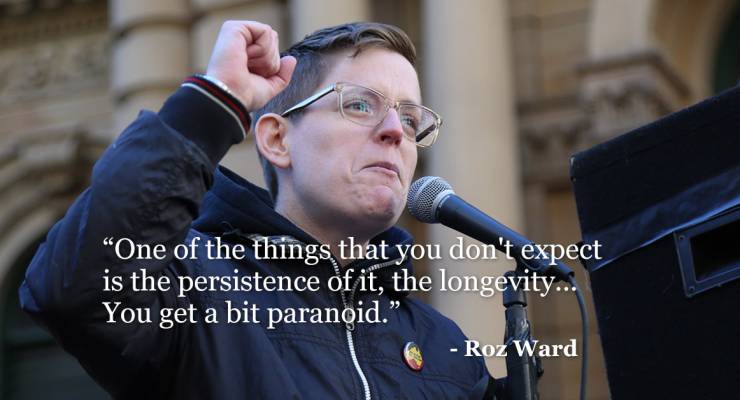
“When it first started to happen to me I was in dread of what was said on Insiders, on The Drum,” said one victim of an Australian Holy War. “I could spend half a weekend in agony over the latest piece on Saturday in The Australian. I don’t read a lot of it now. After a while I just took it as a daily battering.”
Roz Ward says she suffered real physical effects from the stress of the campaign against her. “One of the things that you don’t expect is the persistence of it, the longevity,” she said. As reported in Crikey, in a single month — from February 10 until March 11 — this year The Australian published 27 articles about the Safe Schools program: 18 news articles, three opinion pieces, two editorials and three editions of Cut and Paste. And it quoted more than twice the number of people attacking the program as defending it, led by conservative education academic Kevin Donnelly and senators Cory Bernardi and George Christensen.

“My partner was looking at it every morning not to see if there’s a story, but what the story is,” said Ward. “You get a bit paranoid. If you’re at the pub and talking about politics that somebody could be listening in or whatever. Who would know the extent to which they want stuff if they’re trawling Facebook. Would it be completely out of the question somebody might be here listening?”
Another target, who asked not to be named, said he wouldn’t have been shocked if reporters had “started going through my rubbish bins or looked into my personal life” (although he doesn’t believe that happened), and after reading “what had happened to people the Murdoch empire didn’t like in the UK. there’s not much I thought they wouldn’t stoop to”.
What upset Tim Flannery most was the legitimacy that The Australian‘s campaign against him gave other media outlets’ rage against climate change action.
Yet another target said the experience was disorienting — “it’s black is white, up is down. It doesn’t upset your perspective of the world, but it is nutso. And I have no real ability to get out there and say to anyone who may care to listen, this is crazy stuff. The big media outlets are still controlling the vast block of airspace and online space … It’s like you’re standing inside a cell.”
Margaret Simons told Crikey the worst thing about being the public eye, especially during attacks like The Australian‘s is the effect on families. But, as unfair and unbalanced as the campaign against her was, it hadn’t actually influenced anyone who mattered. “One of the lessons I took away is how little difference it made,” Simons said. “It was horrible at the time to be on the front page, and I minded the attacks on my integrity. But my life hasn’t changed one bit because of that … It’s really made very little difference.”
TOMORROW: The war against Yassmin Abdel-Magied








Crikey is committed to hosting lively discussions. Help us keep the conversation useful, interesting and welcoming. We aim to publish comments quickly in the interest of promoting robust conversation, but we’re a small team and we deploy filters to protect against legal risk. Occasionally your comment may be held up while we review, but we’re working as fast as we can to keep the conversation rolling.
The Crikey comment section is members-only content. Please subscribe to leave a comment.
The Crikey comment section is members-only content. Please login to leave a comment.